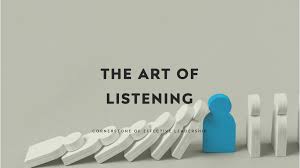Introduction
In the fast-paced world of leadership, the ability to actively listen often gets overlooked in favor of decisive action and assertiveness. However, the most impactful leaders recognize that listening is not just about hearing words—it's about understanding, connecting, and empowering others. The art of listening builds trust, fosters collaboration, and leads to innovative solutions, making it an indispensable leadership trait. This article explores how great leaders harness the power of listening to inspire teams, drive success, and create meaningful change.

1. The Importance of Listening in Leadership
Great leaders understand that listening is a cornerstone of effective communication and leadership. Active listening allows leaders to:
- Build Trust: When team members feel heard, they are more likely to trust their leaders and be open about their thoughts, ideas, and concerns.
- Promote Collaboration: By actively listening to team members, leaders foster an environment of inclusivity where everyone’s input is valued.
- Make Better Decisions: Listening provides leaders with a more comprehensive understanding of challenges, enabling them to make informed and empathetic decisions.
- Empower Others: Leaders who listen empower their teams to share ideas, solve problems, and take ownership of their work.
In essence, listening is a superpower that helps leaders connect deeply and unlock the full potential of their teams.
2. Active Listening: More Than Just Hearing
Active listening is a deliberate and focused effort to understand not just what someone is saying, but also the emotions and intent behind their words. It requires presence, attention, and empathy. The key components of active listening include:
- Giving Undivided Attention: Eliminate distractions, maintain eye contact, and focus entirely on the speaker.
- Asking Clarifying Questions: Leaders who ask thoughtful follow-up questions demonstrate interest and gain deeper insights into what is being communicated.
- Reflecting and Paraphrasing: Repeating key points back to the speaker ensures understanding and validates their perspective.
- Responding with Empathy: Listening with an open mind and acknowledging the speaker’s feelings creates a supportive and non-judgmental environment.
When leaders practice active listening, they create a culture of respect and understanding where team members feel valued.
3. How Great Leaders Use Listening to Drive Success
Successful leaders leverage listening as a strategic tool to enhance their leadership impact. Here’s how:
- Understanding Team Needs: By listening carefully to their teams, leaders identify challenges, concerns, and opportunities for growth. This enables them to provide the support and resources their team members need to thrive.
- Encouraging Innovation: Teams often possess brilliant ideas that remain unheard. Leaders who listen to every voice create space for creativity and innovation to flourish.
- Resolving Conflicts: Active listening is a powerful tool for conflict resolution. When leaders listen to both sides of a disagreement, they can address concerns and find solutions that satisfy all parties.
- Building Strong Relationships: Leaders who listen foster deeper connections with their teams, which strengthens loyalty and commitment to organizational goals.
Listening allows leaders to respond effectively, turning challenges into opportunities for growth and collaboration.

4. The Consequences of Poor Listening
Failing to listen can have significant consequences for leaders and organizations. Poor listening can lead to:
- Misunderstandings: Ignoring or misinterpreting feedback can cause confusion, mistakes, and wasted time.
- Low Morale: Team members who feel unheard may become disengaged, leading to decreased motivation and productivity.
- Missed Opportunities: Leaders who don’t listen risk overlooking valuable ideas or innovative solutions presented by their teams.
- Erosion of Trust: Consistently failing to listen damages trust and creates a toxic environment where open communication is discouraged.
Leaders who do not prioritize listening risk alienating their teams and missing out on opportunities for growth and success.
5. Developing the Habit of Listening
The art of listening can be cultivated through conscious effort and practice. Leaders can develop better listening skills by:
- Practicing Mindfulness: Stay present in conversations by focusing on the speaker without distractions or interruptions.
- Setting Aside Personal Bias: Approach every conversation with an open mind and a willingness to learn. Avoid forming judgments before the speaker has finished.
- Providing Feedback: Summarize what you hear and respond constructively, ensuring the speaker feels heard and valued.
- Creating Listening Opportunities: Schedule regular one-on-one meetings, team discussions, and open forums to actively listen to feedback, concerns, and suggestions.
By cultivating active listening habits, leaders can demonstrate their commitment to understanding and empowering those around them.
6. Listening as a Tool for Transformational Leadership
Transformational leaders use listening to inspire and motivate their teams. They focus on creating an environment of trust, innovation, and collaboration. Key ways transformational leaders use listening include:
- Understanding Individual Motivations: Listening allows leaders to understand what drives each team member, helping them align tasks with their strengths and interests.
- Coaching and Mentoring: Leaders who listen can provide guidance tailored to the needs of their mentees, fostering personal and professional growth.
- Building a Shared Vision: By listening to the team’s input, transformational leaders ensure everyone feels connected to the organization’s goals and vision.
Listening isn’t passive—it’s a proactive leadership skill that creates stronger, more inspired teams.

Conclusion
The art of listening is a defining trait of great leaders. It empowers leaders to build trust, inspire collaboration, and make better decisions, ultimately shaping teams and organizations for success. By practicing active listening and fostering a culture of understanding, leaders can create environments where every voice matters and every idea is valued. In a world that demands connection and innovation, mastering the art of listening is not just a skill—it’s a leadership necessity.


You must be logged in to post a comment.